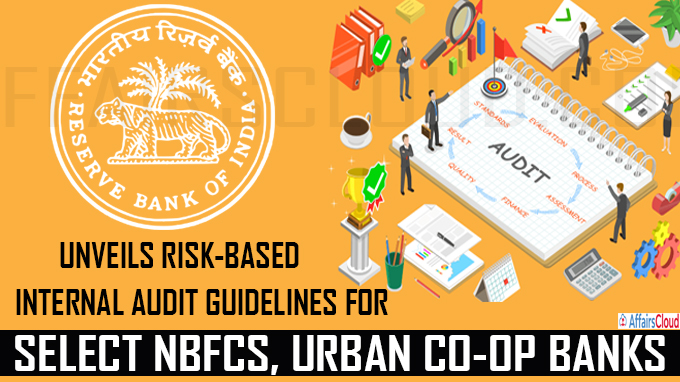 On February 03, 2021 The Reserve Bank of India (RBI) issued guidelines on Risk-Based Internal Audit (RBIA) for selected Non-Banking Financial Companies (NBFCs) and Primary (Urban) Co-operative Banks (UCBs). The mentioned entities have to implement the RBIA framework by March 31, 2022. The guidelines also specified that these entities may also set up a committee of senior executives to formulate a suitable action plan.
On February 03, 2021 The Reserve Bank of India (RBI) issued guidelines on Risk-Based Internal Audit (RBIA) for selected Non-Banking Financial Companies (NBFCs) and Primary (Urban) Co-operative Banks (UCBs). The mentioned entities have to implement the RBIA framework by March 31, 2022. The guidelines also specified that these entities may also set up a committee of senior executives to formulate a suitable action plan.
Aim: To strengthen the quality and effectiveness of the internal audit system of selected entities.
What is RBIA?
i.It is an audit methodology that links with an organisation’s overall risk management framework.
ii.This methodology provides assurance to the Board and its senior management about the quality and effectiveness of the organisation’s internal controls, risk management and governance framework.
iii.Essential requirements of a strong internal audit function include, sufficient authority, proper stature, independence, adequate resources and professional competence, etc.,
Note– At present, all institutions under the supervision of RBI have their own approaches to internal auditing, resulting in some inconsistencies, risks and gaps in the system.
Guidelines of RBIA Framework:
Applicability
The RBIA framework is applicable for the following NBFCs and UCBs:
- All deposit taking NBFCs of all sizes
- All Non-deposit taking NBFCs (including Core Investment Companies) with asset size of Rs 5,000 crore and above
- All UCBs that have asset sizes of Rs 500 crore and above.
Committee of senior executives
i.The committee can address the interim and change management issues.
ii.It also is liable to report about the progress to the Board and senior management periodically.
Implementation
The guidelines must be implemented within the limit under the supervision of the board.
Background
The RBIA system was mandated for all Scheduled Commercial Banks (except Regional Rural Banks) on December 27, 2002. Now, a decision has been taken to mandate the framework for the selected NBFCs and UBCs.
What are Non-Banking Financial Companies (NBFCs)?
i.It is a company registered under the Companies Act, 1956.
ii.It must have a Net Owned Funds of Rs 2 crore.
iii.It engages in the business of loans and advances, acquisition of shares among others but does not have a banking license.
What are Primary (Urban) Cooperative Banks (UCBs)?
i.It is registered as cooperative societies under the provisions of, either the State Cooperative Societies Act of the State concerned or the Multi State Cooperative Societies Act, 2002.
ii.Under the provisions of Section 11 of the Banking Regulation Act, 1949 (As Applicable to Cooperative Societies) UCBs must commence their business if the real or exchangeable value of its paid-up capital and reserves is more than Rs 1 lakh.
Recent Related News:
The Reserve Bank of India (RBI) in its recent 4th Bi-Monthly Monetary Policy Committee (MPC) 2020-21 announced to issue guidelines for Non-Banking Financial Companies (NBFCs) with regard to distribution of dividend. Therefore on December 9, 2020, the apex bank released the “Draft Circular on Declaration of Dividend by NBFCs” to ensure greater transparency and uniformity in practice. It is open for comments by December 24, 2020.




